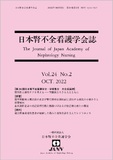Japanese
English
- 有料閲覧
- Abstract 文献概要
- 参考文献 Reference
【目的】慢性腎臓病4期以降の患者が腎代替療法開始前に認知する病気の不確かさの特徴ならびに影響要因を明らかにする.
【方法】慢性腎臓病4期以降かつ腎代替療法開始前の腎臓内科通院中の患者を対象に,療養の場を問わず使用できる病気の不確かさ尺度(UUIS)を用いて調査した.UUISを目的変数,UUISに影響を及ぼすと考えられる全ての変数を説明変数として,ステップワイズ法による重回帰分析を行った.
【結果】調査を完了した102名のうち98名を分析対象とした(有効回答率96.1%).平均年齢70.6(SD=12.4)歳,男性50名(51.0%).原疾患は,糖尿病群19名(19.4%),非糖尿病群79名(80.6%)であった.UUIS総得点の平均値は75.4(SD=21.6)であった.重回帰分析の結果,性別,原疾患,通院歴,医師および看護師の積極的な情報提供,医療への満足度の6因子が不確かさに影響していた(調整済み決定係数〈以下,調整済みR2と略す〉=.275).
【考察】慢性腎臓病4期以降の患者は,他の慢性疾患患者と同程度の不確かさを認知していた.原疾患が糖尿病であることが不確かさを低くしており,他の原疾患と認知状態に違いがあることや医療者の積極的な情報提供が不確かさに影響を及ぼすことが示唆された.
【結論】慢性腎臓病4期以降の患者の不確かさに影響する要因として,性別,原疾患,通院歴,医師と看護師の積極的な情報提供,医療への満足度が明らかとなった.
【Purpose】To understand the characteristics and influencing factors of disease uncertainty in patients with stage 4 or later chronic kidney disease, as perceived before commencement of renal replacement therapy.
【Method】We used a disease uncertainty scale (hereinafter referred to as UUIS) to record the characteristics of the disease uncertainty and influencing factors for patients of the renal internal medicine department with stage 4 or later chronic kidney disease. We performed a stepwise multiple regression analysis with UUIS as the dependent variable and all other variables considered to affect UUIS as explanatory variables.
【Results】Of the 102 distributed surveys, 98 completed surveys were analyzed (valid response rate: 96.1%). The average age was 70.6 (SD=12.4) years, and 50 respondents were men (51.0%). There were 19 chronic kidney disease patients who had the underlying condition of diabetes (19.4%), and 79 patients (80.6%) in the non-diabetic group. The average value of the UUIS total score was 75.4 (SD=21.6). Multiple regression analysis revealed that the following six factors influenced uncertainty: sex, underlying disease, hospital visits, active information provided by doctors and nurses, and satisfaction with medical care (adjusted R2=.275).
【Discussion】Patients with stage 4 or later chronic kidney disease recognized the same degree of uncertainty as patients with other chronic diseases. The finding that lower uncertainty is associated with the diabetic group suggests that the cognitive status of this group is different compared to patients with other underlying diseases. Active provision of information by healthcare professionals affects uncertainty.
【Conclusion】Factors affecting the uncertainty of patients with stage 4 or later chronic kidney disease include gender, underlying disease, hospital visits, active information provision by doctors and nurses, and satisfaction with medical treatment.
Copyright © 2022, JAPAN ACADEMY OF NEPHROLOGY NURSING. All rights reserved.


